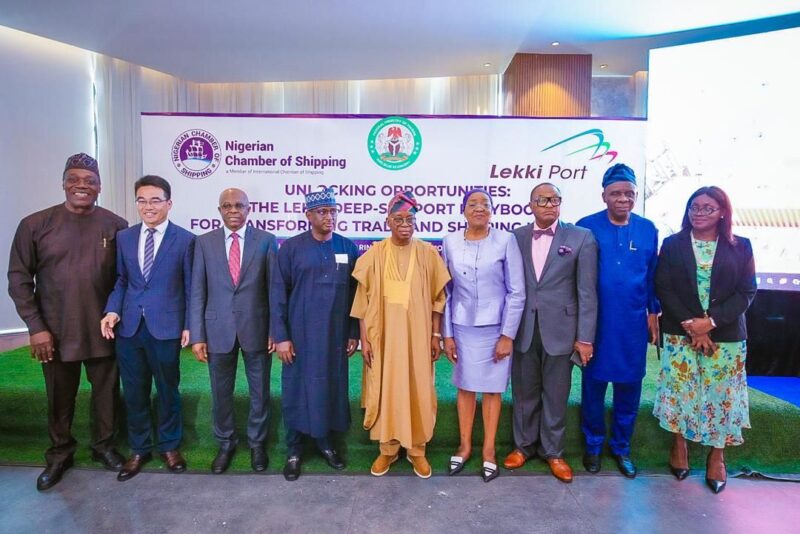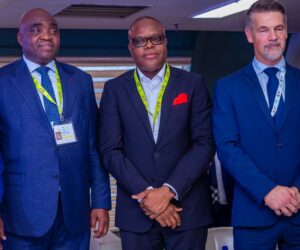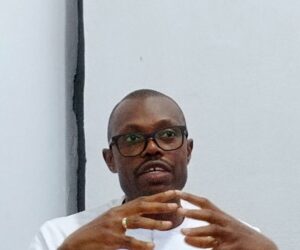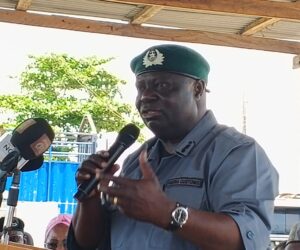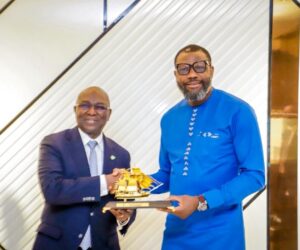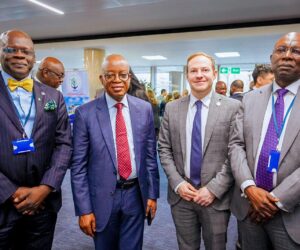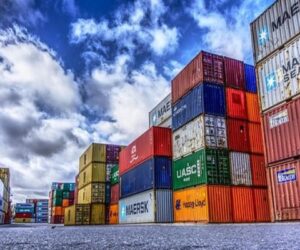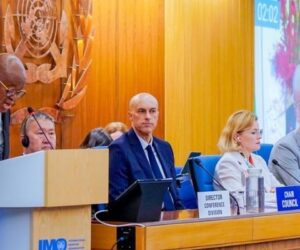0
Honourable Minister of Marine and Blue Economy, His Excellency Adegboyega Oyetola, CON (middle); Managing Director, Lekki Port LFTZ, Wang Qiang (2nd from left); Managing Director, Nigerian Ports Authority, Dr. Abubakar Dantsoho (3rd from left); President, Nigerian Chamber of Shipping, Alhaji Aminu Umar (4th from left); Director General, Nigerian Chamber of Shipping, Vivian Chimezie-Azubuike (right); Executive Director Operations, Nigerian Maritime Administration and Safety Agency (NIMASA), Engr. Fatai Adeyemi (2nd right) and others at a Breakfast Meeting organized by the Nigerian Chamber of Shipping, in Victoria Island, Lagos, on Tuesday.
The Honourable Minister of Marine and Blue Economy, His Excellency Adegboyega Oyetola, has disclosed plans to replicate the success of the Lekki Deep Seaport across Nigeria’s maritime sector.
The Minister cited it as a model for transformative growth and development.
Speaking at the Nigerian Chamber of Shipping Breakfast Meeting in Lagos on Tuesday, Oyetola declared that the administration of Honourable Minister of Marine and Blue Economy, His Excellency Adegboyega Oyetola is committed to building a modern, safe, and globally competitive maritime sector.
The theme of the Breakfast Meeting was “Unlocking Opportunities: The Lekki Deep Seaport Playbook for Trade and Shipping in Nigeria.”
Minister Oyetola said a central component of the current administration’s strategy is the nationwide application of the public-private partnership model and logistical efficiency demonstrated by the Lekki Deep Seaport.
“The maritime industry stands at the heart of our economic aspirations — not merely as a conduit for trade, but as a catalyst for industrial growth, job creation, and regional integration. Our vision is clear: to build a modern, safe, efficient, and globally competitive maritime sector that fully unlocks Nigeria’s economic potential. Achieving this vision will require more than sound policies; it demands sustained investment in infrastructure, targeted capacity building, accelerated digital transformation, and strong, enduring partnerships with the private sector,” the Minister said.
Valued at $1.5 billion, the Lekki facility was hailed as a “landmark achievement” and a “game-changer” for West Africa.
The Minister highlighted its capacity to handle 1.2 million TEUs and accommodate large vessels, noting that it has already generated thousands of direct and indirect jobs.
He also commended the completion of critical access roads, which, for the first time in decades, has freed major Nigerian ports from logistical bottlenecks.
“Cargo now moves out faster, investors move in with confidence, and trade flows without unnecessary delay,” the Minister stated.
He added that the port, which currently operates at only 20 per cent capacity, presents vast, untapped opportunities for investors.
The Minister explained that the “Lekki playbook” is founded on five key pillars: a strategic location, a robust public–private partnership framework, integrated transport links by road, rail, and inland waterways, supportive policies, and technology-driven operations.
To apply this model nationwide, Oyetola confirmed that the Ministry is actively modernizing Apapa and Tin Can Island Ports, and also upgrading the Eastern Ports in Onne, Calabar, and Rivers.
He said, “Under the leadership of President Bola Ahmed Tinubu, GCFR, this administration is committed to taking the lessons of Lekki and applying them nationwide to transform our entire port system into a network of modern, efficient, and competitive gateways. To this end, we are modernising the Western Ports in Apapa, upgrading the Eastern Ports in Onne, Calabar, and Rivers to stimulate balanced regional growth, and finalising the Port Community System — integrated with the National Single Window — to create a paperless, transparent, and secure digital environment for all maritime stakeholders.”
Similarly, in a move aimed at empowering indigenous participation, the Minister said he has directed the Nigerian Maritime Administration and Safety Agency (NIMASA) to immediately commence the disbursement of the Cabotage Vessel Financing Fund (CVFF) to qualified Nigerian shipowners.
He emphasised that a strong national shipping fleet is essential to building local capacity and asserting Nigeria’s presence on global trade lanes, with the ultimate goal of establishing a National Flag Carrier.
Minister Oyetola concluded by stressing that the Lekki Deep Seaport serves as clear evidence of what can be achieved when policy, vision, investment, and execution align.
He urged all stakeholders to replicate, refine, and scale the model for the prosperity of Nigeria and the African continent.
The Breakfast Meeting was attended by heads of government agencies, representatives of terminal operators, shipping companies and the organized private sector.

